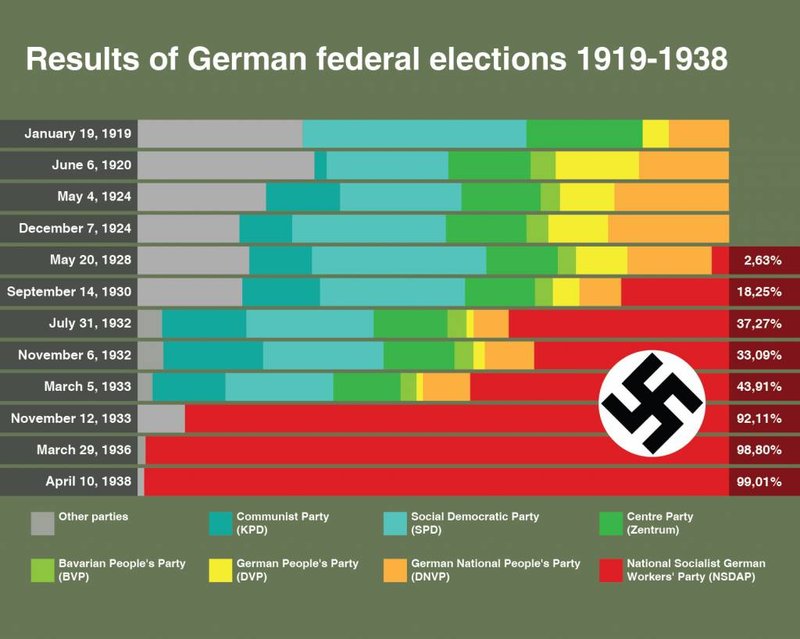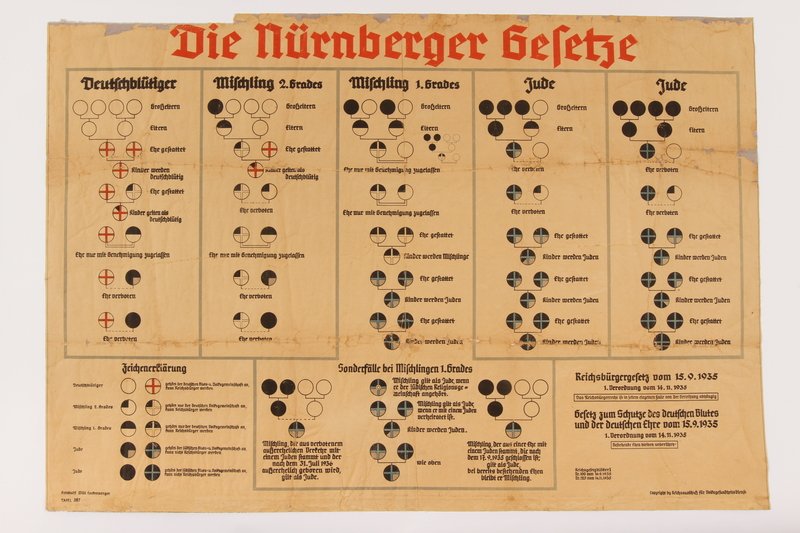Adolf Hitler's Rise to Power
- Food shortages, rise of radical organizations would be prominent in Germany after the Great War.
- There were attempts for coups and other movements.
- After the Great War, Hitler was furious about Germany's defeat and felt that Germany had been humiliated.
Birth of the German Worker's Party
- After the Great War, Hitler would continue his military service, reporting on threats against the Weimar Republic.
- Hitler was assigned to survey the German Workers' party, however he actually liked the party and started his political career by joining the party.
- He was a useful member as he was good at giving speeches and riling people up.
- Hitler wasn't satisfied with being just a member and wanted to control the party.
- Ruhr Valley crisis.
- France occupied the coal-producing Ruhr Valley.
- The Weimar Republic didn't enjoy the occupation of the valley and told to workers to go on strike while still being paid.
- The idea was to make France end its occupation.
- In addition to the economic crisis this ruthless spending led to hyperinflation.
- Hitler and his party members knew that they could seize this crisis as an opportunity.
- However their party was very small and not known across Germany.
- They managed to get the well-known General Ludendorff to join the party.
- They attempted a coup in 1923, but they were greatly unsuccessful.
- About 2000 Nazis arrived in the city center but were confronted by police.
- It was called the Beer Hall Putsch.
- There were some injuries, however most high-ranking figures, such as Hermann Göring escaped or got arrested.
- Despite failure, Hitler gains fame and his party became more known across Germany.
- Hitler got a very lenient sentence in a nice prison, despite his attempted revolution in Germany.
- During his prison stay, he wrote the infamous autobiographical manifesto Mein Kampf.
The Great Depression
- Initially the Germans Workers' party was unpopular as the Weimar Republic was performing well.
- They had gotten loans and investments from the United States and their economy was recovering.
- However the Great Depression would change this as the U.S. could no longer support them due to economic problems after 1929.
- There was a worldwide recession.
- Unemployment skyrocketed in the early 1930s.
- About 1/4th or 1/3rd of the German workforce was unemployed.
- It was very difficult to have functioning coalition government, which Germany had at the time.
- This was because many political parties didn't want to cooperate and couldn't come to decisions.
- During situations like this the President could make decisions without the approvement of the majority.
- Germany took cost-cutting measures, however this only made the depression worse.
- Hitler's populist ideals became popular.
- They promised infrastructure and getting rid of socialists, the people who made the Treaty of Versailles and jews, who had been apparently causing the problems.
- This caused a great rise in popularity for the party.
- The party would also change its name to the National Socialist German Worker's Party, Nationalsozialistische Deutsche Arbeiterpartei in German or NSDAP for short.
New Elections
- There were new elections in 1932 and Hitler's party was very popular.
- After heavy campaigning the NSDAP became the largest party in the Reichstag (the German parliament).
- Their party had lots of propaganda such as speeches and posters.
- Hitler had lots of business so he used luxury technology like airplanes so he could travel across Germany quickly.
- In the July election of 1932 the NSDAP became the biggest party, however they still weren't very powerful.
- However they had, until now, achieved success in mostly legal means.
- Continuing problems led to new elections however.
- Such as a new election in November 1932.
- The November election was a disappointment for NSDAP.
- However, they got about 43% of the votes in the March election of 1933, a huge success.
- The German chancellor at the time, Von Schleicher, was ruling over Germany at the time.
- Hitler realized getting the majority in the election would be difficult without support.
- The NSDAP made agreements with the conservative party.
- Reich president Paul von Hindenburg was initially against Hitler.
- In 1933, Hitler was appointed as chancellor as he had formed a coalition government.
- However, Hitler still wanted to rule over Germany himself.
- The Reichstag Fire occurred in February of 1933.
- A Dutch communist citizen called Marinus van der Lubbe was arrested for the Reichstag fire.
- Whether he was actually responsible was up for debate.
- This was used heavily for propaganda purposes.
- It was said that Germany was in a state of chaos due to the burning of the parliament.
- Goering was in charge of the police force and he prevented the police force from interfering with the NSDAP for the most part, and allowed the NSDAP to achieve votes through violence and threats.
- In November of 1933 NSDAP won by a huge landslide, getting around 90% of the votes, through rigging of course.
- Hitler had needed at least 2/3rds of the parliament votes to impose the "Enabling Act".
- With this "Enabling Act", Hitler temporarily received "temporary" special powers to handle the crisis at the time.
- Hitler was unwilling to give up his power and banned other powers and maintained his strength.
- Von Hindenburg had gotten old and died in 1934.
- This meant that there was practically nothing stopping Hitler from achieving more power.
- Hitler was able to become the "Fuhrer" by combining the power of the chancellors.
- Hitler's movement had closely followed Mussolini's rise to power.

- A chart showing the increase in votes of the Nazi Party over time.
The Night of the Long Knives
- Hitler was worried that one of his old allies Ernst Julius Röhm was too power-hungry.
- Ernst Julius Röhm was the leader of the paramilitary group, the SA (Sturmabteilung).
- The SA was the original paramilitary wing of the NSDAP.
- Hitler used his personal paramilitary force, the SS (Schutzstaffel) to get rid of the SA and killed many people in the so-called Night of the Long Knives.
- The SS started off as Hitler's personal bodyguards but later grew to be intertwined with the government and would later be responsible for running things such as the many execution camps.
- Got rid of any possible rivals, including Ernst Röhm and Von Schleicher.
- The SS would replace the SA as Hitler's paramilitary force.
Nazi Ideology
Main Principles of National Socialist Party
- A totalitarian dictatorship, with the Fuhrer being unquestionable and unopposable.
- Militarism.
- Eugenics, which was already popular in most countries. Eugenics is the belief that some people are genetically "superior" or "inferior".
Important Ideas of Nazi Ideology
- Hitler wanted the unification of all German people, and territory. Such as Austria, the Sudetenland and the Saar region.
- Referred to as "lebensraum", meaning territory necessary for the development of a state.
- The idea of "Über Menschen", or supposedly superior people, mainly the "Aryans".
- They took ideas from other countries and usually twisted them in different ways.
- Populism.
- Only Germans were wanted in Germany.
- The persecution of other races such as Jews.
- It was Hitler's personal beliefs that some races were more superior than others, and he viewed Jews as the lowest of the low.
- Prevention of immigration and the loss of rights for non-citizens.
- Rapid industrialization and improvements for working.
The Persecution of Minorities in Nazi Germany Before World War II
- The Jews would be blamed for the war and economic troubles in propaganda.
- Jews were seen as power-hungry and greedy.
- Germans were viewed as the "superior" race, and other races were unwanted by most German people.
- Concepts such as "blood purity" and other ideas were introduced to separate non-Germans from "pure" Germans, furthering discrimination.
- Ideas that Jews were trying to overthrow or destroy Germany.
- Many minorities were disrespected and mistreated.

- An example of a blood purity chart. It uses family trees to give examples on whether a person should be considered Jewish or German.
- Jewish people lost their rights and were rid of their jobs and boycotted.
- They couldn't marry non-jews, lost their citizenship and right to vote with the introduction of the Nuremburg laws in September of 1935.
- They would lose more rights such as education.
- Jews would be marked in special ways to differentiate them and seperate them, such as with David's Star pins.
- Many Jews would be sent to ghettos, such as in Poland.
- Forced emigration, although other countries weren't willing to take the refugees.
- Attacks on Jewish homes by the SS, such as the Night of Broken Glass.
- The Night of Broken Glass, or Krystalnacht, was carried out by the Sa and SS after the assassination of the German diplomat Ernst vom Rath by Herschel Grynszpan, a 17-year-old German-born Polish Jew living in Paris.
- Attacks on Jewish businesses, homes and synagogues, such as shattering windows or burning.
- Jews and other minorities such as homosexuals, Romani people, disabled people and so forth were segregated and lost their rights.
- A publication manufactured by the Russian secret police called the The Protocols of the Elders of Zion, which raised ideas that the Jewish people had a secret society and other conspiracies.
- This popularized already popular ideas at the time such as eugenics and anti-Semitism.
Life in Nazi Germany
- Nazi-ideology was spread to every aspect of society.
- The press was under the control of the state.
- Ideological teaching of schools.
- Such as "home-economics" and racial teachings for girls (aiming for them to produce many children) and eugenics, history and physical education for boys (aiming to make them soldiers).
- Youth organizations such as the Hitler-jugend.
- The Nazis started several economic programs.
- The economy in Germany recovered well.
- Public constructions, such as high ways or autobahns.
- Women were aimed to be removed from the workforce so that they would stay at home and raise kids.
- Success in society becomes dependent upon party membership.
- Those who stuck up for the Nazi Party would be given high positions rather than those with high skills or educations for example.
- No government contracts.
- No university positions, such as professors.
- Control over the judicial system, etc.
- Constant threat of violence from Nazi paramilitary forces and secret police, called the Gestapo.
- Political opposition and other dissidents to concentration camps or prisons.
- Re-education, labor and executions.
- Re-armament.
- Old buildings were used as factories and many military agreements and programs with other countries were established.
- Dummy corporations to order parts for submarines, etc.
- Rebuilt their military: tanks, air force, navy, etc.
- France and Britain (who enforced the Treaty of Versailles) weren't bothered by Germany's progression, and Hitler grew braver.
- Many people believed that they had been too harsh on Germany, and that Germany should be allowed to rebuild its military.
Image Sources
https://histoire.museeholocauste.ca/en/timeline/nazi-path-power